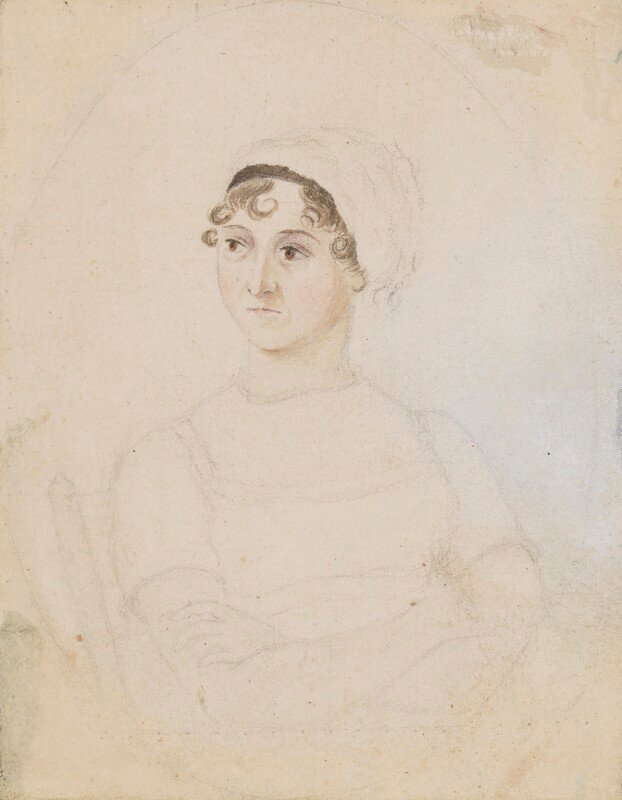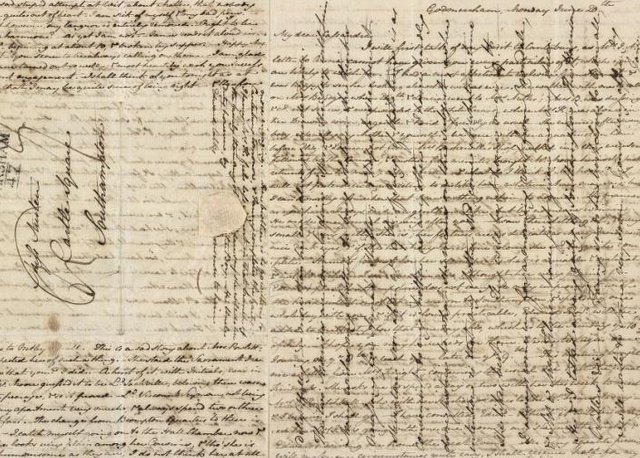Jane Austen wrote to advance realism in fiction, as revealed in her letters to her niece, Anna Austen Lefroy | by Leysa Flores

Image: Jane Austen by Cassandra Austen, pencil and watercolour, circa 1810, NPG 3630 © National Portrait Gallery, London
In the comments of another post the other day, I discovered a fellow Steemian is also a Jane Austen fan. Not only has she also read all of her novels more than once, but also her letters. She reminded me that "after filling up the page she would turn it 90 degrees and write again on top of the text". How marvellous!

Image: Letter to Godmersham (Source)
I particularly enjoyed the letters Jane Austen wrote to her niece, Anna Austen Lefroy.
The letters, critiquing the young authoress’ novel, are an informative and insightful resource as they give evidence of Austen’s preference and passion for advancing realism in fiction.
The letters were written between 1814-1816. At this time, Austen had already written and published Sense and Sensibility, Pride and Prejudice, and Mansfield Park. She had also written Susan, (later retitled “Catherine” and posthumously published as Northanger Abbey), and sold to a publisher. During 1814-1815, Austen was working on Emma.
This is of particular relevance as we can draw parallels between Austen’s advice and the style of realism we see in her writing. It is evident Austen disapproved of “perfect” characters with predictable (at the time, often sentimental or didactic) endings.
“I like the beginning of Devereux Forester very much, a great deal better than if he had been very good or very bad.”1
“Henry Mellish will be, I am afraid, too much in the common novel style – a handsome, amiable, unexceptionable young man (such as do not much abound in real life), desperately in love and all in vain.”2
Rather, she valued realistic portrayals of characters and concluded her novels in a way that allowed the reader to decide for themselves if the ending was “happy” or not. She also did not approve of conventional novelistic narratives, mocking their predictability.
“Devereux Forester's being ruined by his vanity is extremely good, but I wish you would not let him plunge into a "vortex of dissipation." I do not object to the thing, but I cannot bear the expression; it is such thorough novel slang, and so old that I daresay Adam met with it in the first novel he opened.”3
“The description of Dr. Griffin and Lady Helena's unhappiness is very good, and just what was likely to be. I am curious to know what the end of them will be.”4
We can see further evidence of this in the way Austen treats some of her own characters (who would traditionally be considered “bad”), comparing the way they have misbehaved and how their stories end. Traditionally, “bad” characters would be given a “bad” ending, so as to educate the reader, in a patronizing way, about a particular religious, philosophical, historical or political view. However, Austen allows her “bad” characters second chances, feeble punishment and even forgiveness.
Marianne, in Sense and Sensibility, is given a second chance at love. After becoming entangled with and abandoned by Mr Willoughby, moves on to find true love with Colonel Brandon.
“Marianne could never love by halves; and her whole heart became, in time, as much devoted to her husband, as it had once been to Willoughby.”5
Lydia (Pride and Prejudice) is allowed to recover from the scandal of running off with Mr Wickham, and they marry. Frank Churchill (Emma) is forgiven for manipulating and playing games with the other characters (to ensure his secret engagement to Jane Fairfax remained concealed); his disapproving aunt also conveniently dies and he ends up marrying Jane.
In Mr Knightley’s words, “He (Frank) has had great faults, faults of inconsideration and thoughtlessness; and I am very much of his opinion in thinking him likely to be happier than he deserves: but still as he is, beyond a doubt, really attached to Miss Fairfax, and will soon, it may be hoped, have the advantage of being constantly with her.”6
Austen’s skill in portraying realism is a hallmark of her writing style which has endured the passing of time. The inscription on the tablet of the walls of Chawton Cottage (the house where Jane lived and wrote) says: "Such art as hers can never grow old."7 This is true, because she wrote about human nature, which has been remained unchanged since the beginning of time.

Image source
Any other Jane Austen fans here?
1 Letters of Jane Austen – Brabourne Edition, LXXXV, Letters to her niece Anna Austen Lefroy, 1814-1816. http://www.pemberley.com/janeinfo/brablt16.html.
2, 3 Letters of Jane Austen – Brabourne Edition, LXXXVIII, Letters to her niece Anna Austen Lefroy, 1814-1816. http://www.pemberley.com/janeinfo/brablt16.html.
4 Letters of Jane Austen – Brabourne Edition, XCI, Letters to her niece Anna Austen Lefroy, 1814-1816. http://www.pemberley.com/janeinfo/brablt16.html.
5 Jane Austen, Sense and Sensibility, London, Penguin Books, 2003, p. 352.
6 Jane Austen, Emma, London, Penguin Books, 2003, pp. 418-419.
7 Constance Hill, Jane Austen, Her Homes & Her Friends, Bungay, Richard Clay & Sons, Ltd., 1923. http://digital.library.upenn.edu/women/hill/austen/homes.html.
References
Letters of Jane Austen – Brabourne Edition, Letters to her niece Anna Austen Lefroy, 1814-1816. http://www.pemberley.com/janeinfo/brablt16.html.
Jane Austen, Sense and Sensibility, London, Penguin Books, 2003.
Jane Austen, Emma, London, Penguin Books, 2003.
Jane Austen, Pride and Prejudice, Penguin Books, 2003.
Constance Hill, Jane Austen, Her Homes & Her Friends, Bungay, Richard Clay & Sons, Ltd., 1923. http://digital.library.upenn.edu/women/hill/austen/homes.html (accessed February 20, 2018).
I'm glad that my comment about Austens letters encouraged you to write this excellent post! I'm sure steemit has more fans of Jane Austen:)
Thank you! 😚😊
Posted using Partiko iOS
These are some of my favorite lines from Pride and Prejudice.
Posted using Partiko Android
Yes!! 👏👏👏 My favourite line from P&P would have to be, “It’s been many years since I had such an exemplary vegetable.”
Posted using Partiko iOS
You got a 11.83% upvote from @ocdb courtesy of @leysa! :)
@ocdb is a non-profit bidbot for whitelisted Steemians, current max bid is 20 SBD and the equivalent amount in STEEM.
Check our website https://thegoodwhales.io/ for the whitelist, queue and delegation info. Join our Discord channel for more information.
If you like what @ocd does, consider voting for ocd-witness through SteemConnect or on the Steemit Witnesses page. :)